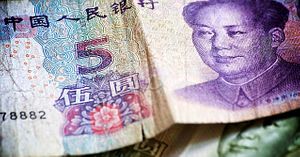Trans-Pacific View author Mercy Kuo regularly engages subject-matter experts, policy practitioners and strategic thinkers across the globe for their diverse insights into the U.S. Asia policy. This conversation with Andrew Polk – founding partner of Trivium/China, a Beijing-based research firm; former director of China research at Medley Global Advisors; and economist at the Conference Board’s China Center – is the 106th in “The Trans-Pacific View Insight Series.”
Explain the implications of the State Council’s recently announced curbs on overseas investment.
The implications of the recent announcement itself are fairly muted because these policies have effectively been in place for the past several months. In fact, the new State Council guidelines effectively just codify existing policy. That being said, the fundamental implication of the overall policy is that China’s regulators want to have a greater say over where and how China’s financial resources are deployed – whether those resources are nominally state-owned or private. The policy is not simply to curb outbound investment overall, but to funnel it into preferred sectors – namely anything that can help to move China up the technological value chain or that supports Xi Jinping’s Belt and Road Initiative. In that sense, this move very much correlates with the push that has taken place over the past several years to give the Party and the government more control over domestic economic resources. One further implication is that outbound deals have become more politicized, which will give foreign governments even more reason to scrutinize and potentially block deals.
What is impact of the curbs on trends in global mergers and acquisitions?
The immediate impact will be a significant reduction in the growth of global M&A (mergers and acquisitions). China has been basically the only major player in this space recently, so reducing China’s outbound investment by over 40 percent will have an immediate impact on the headline size of deals. But there are two important things to remember. First, China is not shutting down deals altogether – they are just trying to rein in what they see as “irrational investment.” The sheer size of the spike in Chinese deal-making that we saw in 2016 was clearly unsustainable, but the broader trend of China being a big player in global M&A remains intact. Secondly, the mix of Chinese deals will change. Authorities are zeroing in on areas like real estate, hotels, luxury, entertainment and sports teams for greater restrictions. They deem such deals as having no “national benefit.” But investments in ports, utilities, commodities and technology are very much encouraged right now. So it’s likely that even more Chinese money goes into those spaces.
How do these guidelines advance the One Belt, One Road Initiative?
Per my points above, the new guidelines are meant to encourage companies to spend on the Belt and Road Initiative (BRI). However, rather than genuinely bringing substantial amounts of new investment into BRI, it’s more likely that companies will try to find some “BRI tag” that they attach to a given project in order to help ensure its approval. That will advance the BRI by definition because every approved deal that is labeled as BRI can be added into the vast sums that China is spending on the initiative. Backing out a bit, though, the BRI has very cleverly not been assigned any specific metrics for success, so judging whether it has achieved its aims will be virtually impossible. From that standpoint, the adjustments to outbound capital flows will not be a game-changer – either positively or negatively – for Xi’s Belt and Road Initiative, but they may help drive some cash to the initiative on the margin. On a basic level, the sources of funding will do nothing to affect the viability of a given BRI project, and it’s the viability of investments that will determine whether the policy push is ultimately sustainable.
What is the effect of stricter regulations on state-owned enterprises and private companies, such as Anbang, Fosun, Dalian Wanda, etc.
Regulators have effectively sent the message that SOE spending will be the real avenue for stricter governance of outbound spending, but they have also indicated that private companies essentially need to play by the same rules. One of the fundamental drivers of stricter outbound investment policy has been the Chinese leadership’s desire to avoid the Japanese scenario from the 1990s. China’s policymakers believe that overly aggressive outbound deal-making, at sky high valuations, was one of the dynamics that made the Japanese economy more vulnerable to a bursting bubble. China’s policymakers want to avoid Japan’s fate from that time, so it doesn’t matter if a company is state-owned or private, the deals themselves are where policy is aimed. If anything, SOEs may be able to make a stronger case that outbound investment is strategic, and so they may have an easier time getting approval for some projects than would private enterprises.
Explain the role of the People’s Bank of China in the State Council’s investment crackdown.
The main entity within the PBoC that is charged with implementing these new rules is the State Administration of Foreign Exchange (SAFE). SAFE plays this role largely because it governs how and when companies can obtain foreign exchange in order to complete such foreign deals, which are primarily transacted in dollars. SAFE has increased its scrutiny over the paperwork associated with outbound investment, and other cross border capital flows, partly as an expedient way to offset China’s recent capital outflow pressure. But more generally, SAFE is undertaking a genuine effort to better enforce existing laws that govern how money can legally be taken abroad. SAFE’s role, therefore, is to ensure that any request for foreign exchange meets all the proper requirements and has all the proper documentation. It does not typically approve or disapprove of a given transaction itself.
































